Dachshunds are spunky dogs with vivacious personalities. They are tiny, yet fierce in their quest to hunt and protect their domain.
Dachshunds come in three coat types, and they can be classified as “miniature” or “standard” based on weight and measurements.
Miniature Dachshunds are just one weight classification within the breed. If a Dachshund weighs 11 pounds or less, it’s a miniature.
Exactly how big does a miniature Dachshund get in comparison to a standard Dachshund?
We’ll answer that question in this article, as well as discuss how to determine which category your Doxie falls into.
What’s the Difference Between a Standard and Miniature Dachshund?
Standard and Miniature Dachshunds are the same AKC recognized breed. These two types fall under the same “Dachshund” umbrella.
The only difference between a standard and miniature Dachshund is their weight and height.
Miniature Dachshunds weigh up to and including 11lbs, and grow to be 5-6 inches tall.
Standard Dachshunds weigh from 16-32lbs and will be about 8-9 inches tall.
So, what about Dachshunds that fall between 12-15lbs?
The main difference between a miniature and standard Dachshund is their height and weight. They are not different breeds.
Since the AKC breed standard for Dachshunds does not clearly define dogs that fall in the 12-15 lb range, it has led to some confusion as to what to call that size.
In the Dachshund community, Doxies that fall in the 12-15lb group are affectionately known as “Tweenies.”
According to the AKC, these Dachshunds would be classified as standard.
The classification that does not offer any leeway is the miniature Dachshund, who won’t weigh more than 11lbs.
I Bought a Miniature Dachshund Who Grew to Standard Size. Why?
If you are buying a Dachshund puppy from a responsible breeder, they will match only miniature Dachshunds mates with each other (and standards with standards).
However, that does not guarantee what size their puppies will be when full grown.
Miniature Dachshund parents can have standard puppies and visa versa.
Since both size of Dachshunds are the same breed (just a different size description), it is common for miniature Dachshund parents to have puppies that grow to be larger than than they are.
The more established a breeder is in their program, the more they will be able to predict what size the puppies will be.
The more established breeders often know more about their Dachshund’s lineage and already has experience with one or several litters from the same parents.
Although a good breeder will breed for consistency, it sometimes works out differently despite them trying!
What if My Dachshund is Registered as a Miniature But Weighs Over 11 lbs?
Right at birth, it’s hard to tell how big a Dachshund will get, but if the puppy was bred by miniatures, it’s easy to make an assumption.
Breeders complete the AKC registration papers for their puppies based on the size of the parents, not the guaranteed size they will be when full grown.
Dachshund puppies are most often registered with the AKC before they are full grown and based on the size of the parents.
The process of AKC registration just requires the breeder to fill out a form and to send in money. The AKC does not physically check the dog being registered.
Remember – miniature Dachshunds can give birth to standard Dachshunds, so there’s a possibility that your pup may grow up to to be a larger size than it’s parents.
Therefore, your miniature Dachshund that weighs more than 11lbs is potentially a standard, despite what the registration papers say.
But there’s something else to consider, and that’s your dog’s physical shape.
If your Dachshund is over 11lbs, is that simply because they are overweight?
If you put 12lb Fido on a diet and exercise regimen, would they be 10lbs when in ideal physical condition?
Your veterinarian can help you figure out the right weight for your Dachshund.
If so, you may indeed have a miniature Dachshund trapped inside a bigger dog’s body.
If your pup is overweight, not only would it’s health benefit from losing the excess weight but then you will truly know if your Dachshund is a miniature or standard.
If you’re not sure about your Doxie’s diet or ideal body shape, that’s a discussion we suggest having with your veterinarian.
When Do Dachshunds Stop Growing?
Smaller dogs mature earlier in life than larger dogs.
There are some discrepancies when it comes to determining when Dachshunds are considered “full grown” but the general consensus is that they stop growing between 10-12 months old.
Then, your Dachshund can continue to fill out (gain muscle and get wider) until they are about two years old.
Now you may be wondering how big your Dachshund puppy will get. Here’s some math to help:
If your Dachshund gets to be more than 11 lbs as an adult, they’re considered a standard Dachshund.
An average newborn puppy will typically double their birth weight by the time they are one week old.
So, by six weeks old, you can calculate a weight prediction for your Dachshund.
Take their six-week weight, double it, then double it again.
The result of that equation is the predicted weight of your Dachshund when fully grown.
For example, if a dog weighs 2lbs at six weeks old, they are predicted to weigh around 8lbs as an adult.
Here is a puppy weight calculator which can also be a helpful tool.
There’s no way to be absolutely sure how big your Dachshund will get, but the above calculator can at least give you a general idea.
Frequently Asked Questions
Are miniature Dachshunds considered a different breed, or is it just a “chance by birth” situation?
Miniature and standard Dachshunds are the same breed, although they have different genes that determine what they look like.
All Dachshund types fall under the same breed category, and ultimately their size is left completely up to chance.
Of course, you’re more likely to have a miniature Dachshund if two minis were bred together, and the same can be said with standards.
But remember that you can get a mini Dachshund from standard parents, or a standard even if the parents are both miniatures.
How big do mini Dachshunds get?
A miniature dachshund stands 5-6 inches at the shoulder, and weights up to and including 11lbs fully grown.
If your Dachshund stands closer to 8 -9 inches at the shoulder, and weighs 12lbs or more at adulthood, then it is considered a standard.
Note that Dachshunds that fall between 12-15 lbs are sometimes affectionately called a “Tweeenie” size by Dachshund owners but that is not a formal size recognized the AKC.
Do miniature Dachshund bark a lot?
Dogs in the Dachshund breed were developed to be hunting dogs.
The Dachshund breed is known for being very vocal.
Because of their ancestry and instincts, miniature Dachshunds do tend to bark frequently.
They have a keen sense of hearing, and are very alert for any noises, so sometimes it may seem like they are barking at nothing (because you can’t hear it).
If excessive barking is not desired in your household, check out these tips for reducing your Dachshund’s barking tendencies.
What are some personality traits of miniature Dachshunds?
Mini Dachshunds may be compact, but they have tenacious personalities with a side of loyalty and cleverness.
Dachshunds were bred to hunt, so they will enjoy chasing nearby prey or digging holes.
It’s important to keep your mini Dachshund exercised mentally and physically to keep them happy and out of trouble.
They are amazing little dogs but they are not for everyone. As yourself these questions before you decide to make a Dachshund part of your family.
Final Thoughts
Dachshund’s are capable of stealing your heart no matter what size they are.
To quickly recap:
Miniature Dachshunds are always 11lbs or under. The AKC breed standard is crystal clear about this.
Standard Dachshunds generally weigh 16-32lbs.
However, do consider if your Dachshund is overweight. Your dog may indeed be a miniature Dachshund trapped under some body fat.
A Doxie weighing between 12-15lbs would also be put into the standard category but is sometimes affectionately referred to as a “Tweenie” size by Dachshund lovers.
Whether you have a standard or miniature Dachshund, they are all amazingly fun dogs that will offer plenty of entertainment, companionship and love.
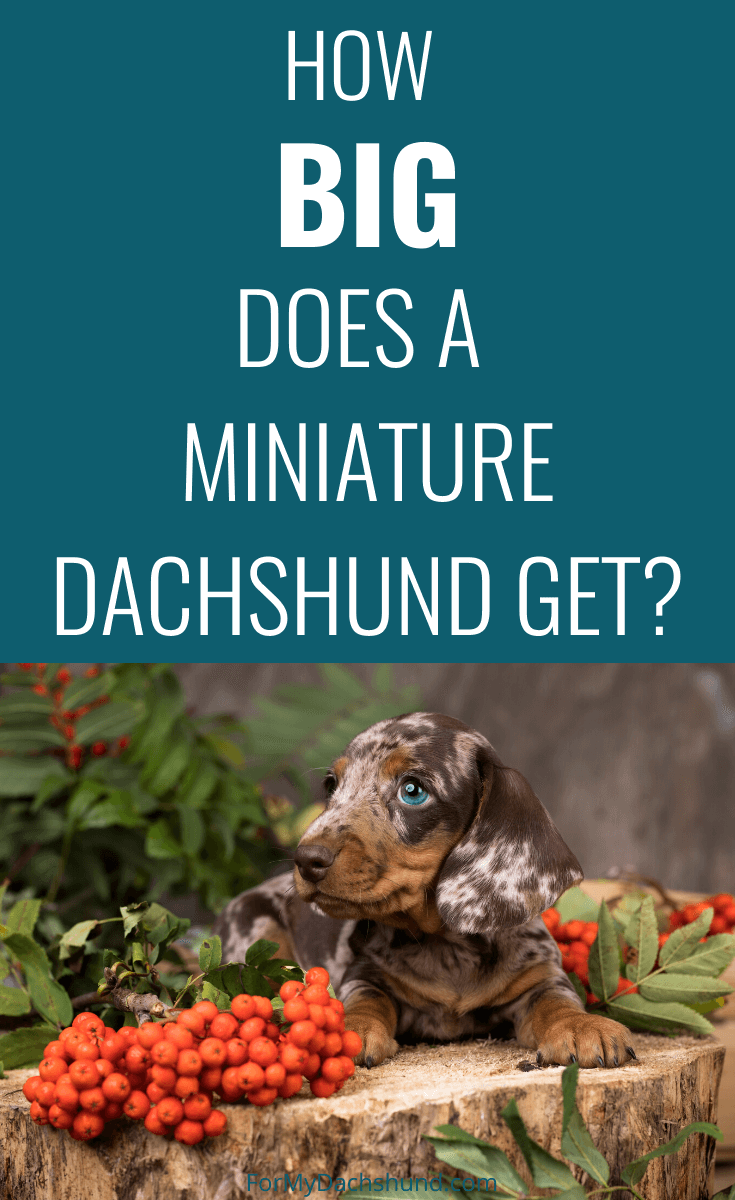
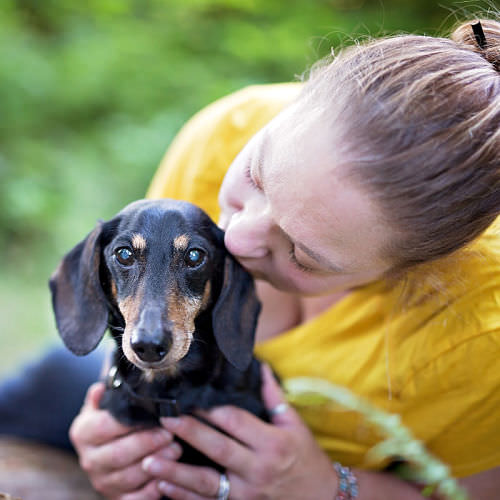
About the Author: Through her 17 years of owning and caring for Dachshunds, and almost 10 years researching and writing about them, JW has become a respected expert in the Dachshund community. Read more about her here.


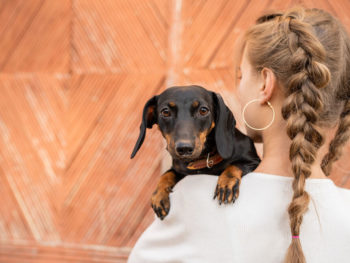
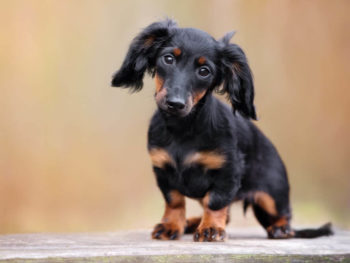
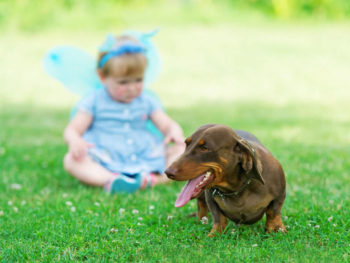
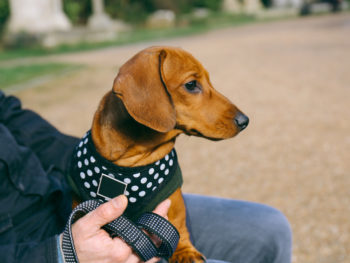
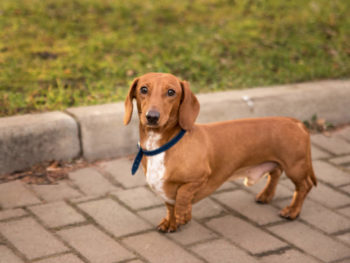


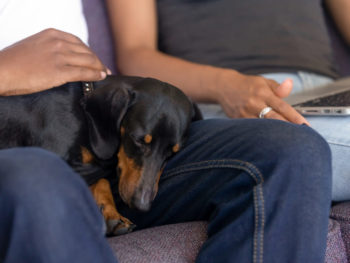
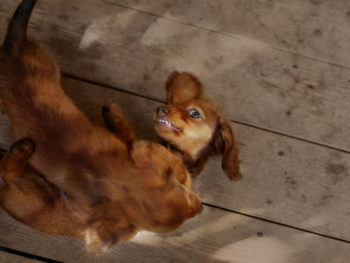
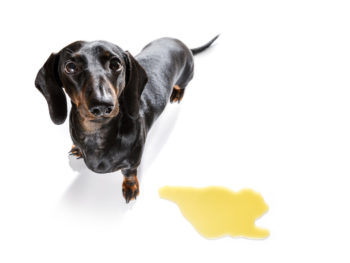
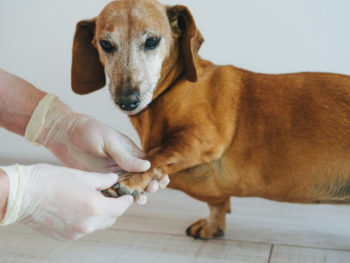
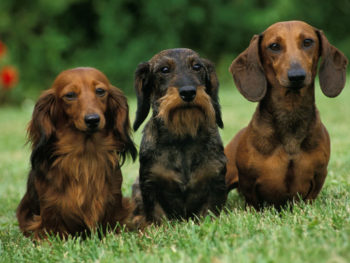
 Free Feeding vs Scheduled Feeding Your Dachshund: Which is Better?
Free Feeding vs Scheduled Feeding Your Dachshund: Which is Better?


